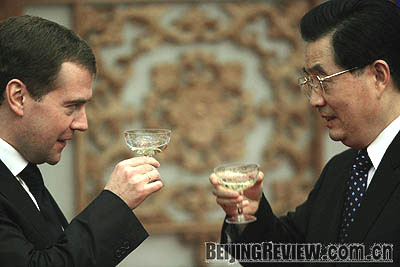|

CHEERS!: Chinese President Hu Jintao and Russian President Dmitry Medvedev toast each other after a meeting at the Great Hall of the People in Beijing on May 23
Dmitry Medvedev was sworn in as Russian president on May 7, officially beginning the Medvedev-Putin era. The alliance guarantees that the new president will stick to his predecessor Vladimir Putin's political, economic and diplomatic policies and lead the country to prosperity. In this respect, Sino-Russian relations will continue developing healthily. And Medvedev's visit to China was the first step in maintaining the propensity for friendly contact between the two.
In the past years, Putin mapped out and carried out a series of plans to revitalize Russia, and he made remarkable achievements.
Medvedev, a key member of Putin's administration who participated in diplomatic policymaking, is clear that close Sino-Russian ties are in accordance with Russia's current situation and will benefit its national interests. It makes good sense that the new president will stick to and promote this diplomatic policy.
Having experienced the Boris Yeltsin era and the Putin era, the Sino-Russian relationship has been upgraded to a strategic and cooperative partnership from a normal bilateral relationship. The current Sino-Russian ties are completely different from that of the early 1990s. Political mutual trust between the two countries is unparalleled. In 1991, the trade volume between China and the Soviet Union was only $1.1 billion. In 2007, the Sino-Russian trade volume amounted to $48.1 billion.
In 1992, only several dozens of thousands of people in the two countries crossed the borders and communicated. But in 2007, data indicated that more than 3 million stepped into the other country. After the two nations settled their border issues, communication and cooperation in cities along the borders have expanded rapidly. Military exchanges between the two sides have become more and more frequent. In 2006 and 2007, the two countries held the Year of China in Russia and the Year of Russia in China activities, respectively, which greatly deepened communication among their peoples.
When one of the countries experienced such tragedies as the Beslan school hostage crisis in Russia and the Wenchuan earthquake in southwest China, their citizens have shown great support and sympathy for each other, making them appreciate the other more. Through various exchanges in different areas, the bilateral relationship has grown stronger, and misunderstandings have diminished. The friendship tree is growing into a dense forest. China is the country that is friendliest to the Russian people, according to a poll conducted in Russia in 2007.
Medvedev was in charge of China affairs before he was elected president. He is one of the Russian politicians who is truly familiar with Sino-Russian relations. During 2006 and 2007, he had visited China many times and attended activities related to the cultural years both in Russia and China. He not only met and exchanged views with Chinese leaders and entrepreneurs, but also communicated with the Chinese people through online discussions in 2007. His frank and sincere attitude and his deep understanding of China have greatly impressed Chinese netizens.
Currently, China and Russia are working on promoting their bilateral relations, because they need to cooperate on common interests and coordinate their efforts on different national interests. They will face new problems in the development of their bilateral relationship. This will demand that leaders and citizens in each country join hands to resolve possible disagreements.
There are four areas that the two countries should work on during Medvedev's four-year presidential term.
The first is deepening bilateral political mutual trust and friendship between their citizens through regular meetings and broad communication on different levels and topics. This will enable them to forge precious understandings and provide support for each other, especially on important issues that concern both.
The second is settling problems in bilateral trade and economic cooperation to guarantee that they will reach their target trade volume of $80 billion in 2010. Issues in this area will focus on China's growing trade surplus, the decreasing export levels of Russian mechanical and electric products, Russia's high energy export prices and a slowdown of investment on both sides.
The third area is sponsoring more cultural and scientific exchanges to promote effective cooperation in building environmentally friendly society along the borders. The two countries also plan to strengthen their cooperation on environmental protection and energy use.
The fourth area is improving their cooperation on world affairs. The two sides should continue their close negotiations and cooperation under the frameworks of international and regional organizations such as the United Nations and the Shanghai Cooperation Organization. This will help them peacefully resolve such international disputes as the nuclear issues in Iran and the Korean Peninsula and promote the improvement of the world political, economic and security orders.
The author is a Russia studies researcher at the China Institutes of Contemporary International Relations | 